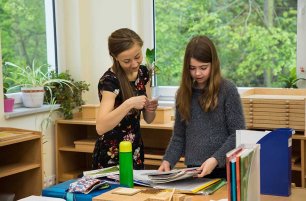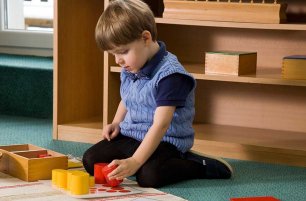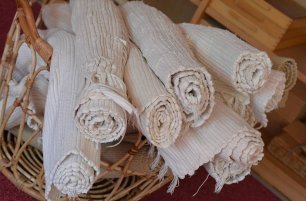Benefits of Practical Life for Toddler Development
“The first thing to realize about these exercises of practical life is that their aim is not a practical one. Emphasis should be laid not on the word “practical” but on the word life. Their aim is to assist development.”
E. M. Standing, Maria Montessori: Her Life and Work
A key aspect of Montessori environments, especially for younger children, is the Practical Life curriculum and area of the classroom. This is something that sets the Montessori approach apart from other schools, daycares, or teaching methods. We know that children as early as birth are already absorbing everything from their environment through their senses. In the first year of life, babies are gaining knowledge through everything they see and experience, and through all of the language that is being spoken to and around them. We can see that toddlers quickly gain more and more movement skills and they are eager to participate in daily life with us. They see us doing activities like sweeping, cleaning dishes, or washing our hands and they want to help and do these things too! As adults, we might think of these tasks as tedious chores but to the small child, these can be an incredible opportunity to practice language, movement and coordination, order, and independence.

During the years from birth to three, small children form the foundation of who they are as a person. They are both physically and mentally constructing themselves based on the knowledge they gain through their experiences. Practical Life activities show toddlers how they can do things for themselves, contribute to their community, and achieve skills through meaningful work with intelligent purpose. We recognize the importance and positive effect that these activities have on small children like giving them confidence, strong self-esteem, and a positive self-image. This is creating a foundation for them in which they can be successful and independent.
Our Practical Life curriculum consists of specific activities that are always available in the classroom like plant watering, mirror cleaning, and flower arranging among many others. Over time, children know where to find these materials and eventually, we see that they are doing the activities independently without ever being asked. For example, a child might spill some water on the floor and another child goes for the small mop to help clean it up. This means they are internalizing a sense of order and routine, learning to help others and care for their community, and gaining both cognitive and movement skills. Parents often ask us how they can incorporate more Practical Life activities at home and many of these exercises can be easily adapted and introduced into the home environment.

Our aim is to offer enriching opportunities for children to participate in daily life with us while also gaining skills in movement, language, order, concentration, and functional independence. We don’t need to have the fanciest things or the newest toys, an activity could be as simple as preparing a snack together. You can use a small cutter with a blunt edge or a butter knife and show your child how to slice a banana or spread butter on bread. We keep the goal in mind throughout the activity such as describing how the banana smells or tastes, collaborating together as a team, and offering the child a turn to practice by themselves. We are showing them that we see them as capable, we trust them and value their efforts, and they are a vital member of the family or community.
Through Practical Life activities like slicing a banana, the child also learns steps and procedures which helps lead to an understanding of order and sequencing. For instance, first we must wash our hands then we take the items to the table carefully one by one.
Once we have finished, we clean up after ourselves. All of these steps might seem insignificant to us, but to small children, it greatly helps them understand and internalize a sense of order. Order helps the child understand the world around them, it aids in the development of knowledge and intelligence, and once the child understands the order or the routine, they can practice things more independently.

We see this especially in the area of self-care as toddlers enter our community and from the beginning, we show them activities like how to take off and put on their own shoes or get dressed by themselves. These things take time, patience, and practice but then one day we see that the child has arrived at school, put their items away, and successfully changed their shoes all by themselves. And we also get to see how proud they are that they did this all on their own!
We encourage children to take an active role in helping take care of themselves, others in their community, and the environment as a whole every day in our Toddler classrooms. It’s a joy to observe their resilience and determination, their kindness, and their willingness to help others through these Practical Life opportunities. These activities bring a sense of awareness to the needs of the environment and the group. At first, we can see that toddlers tend to be quite egocentric and for them, they are the center of the world. But over time, they begin to understand how their actions affect others. Through this meaningful work, they can see their effect on the community around them and how they are helping in the bigger picture. This brings them a sense of value and self-worth; they start to see themselves as capable and able to help others.

Practical Life is fundamental to the work we are doing with young children. It helps them not only gain movement skills like balance, coordination, and working with their hands, but it also connects children to their culture, language, and community. These activities have a powerful effect on children’s developing self-image and self-esteem. We can provide plenty of diverse and enriching sensory learning experiences for our children simply by engaging in life together and involving them in our daily activities every step of the way.
By Lindsey Taylor
Want to learn more? Read our next article:
7 BENEFITS YOUR CHILD CAN GET WHEN STARTING MONTESSORI EARLY




